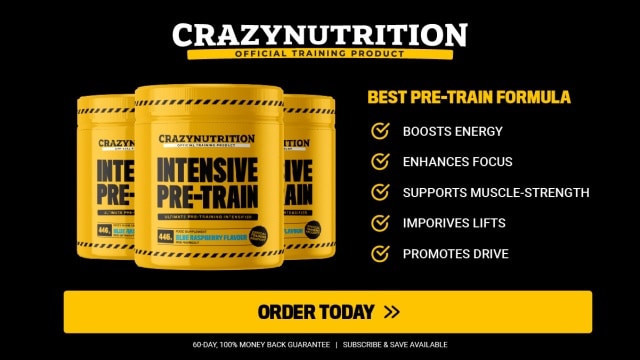How Much Pre-workout is Too Much for You?
Max Health Living is a reader-supported site. Purchases made through links may earn a commission. Learn more.
You’ve probably heard about pre-workout supplements, and maybe you’ve even tried one or two. Most guys love them because they give you energy, and make your workouts more productive.
But there’s always the question of how much pre-workout is too much. Most times, this depends on the caffeine content.
Your body can become dependent on daily doses of caffeine, and there are side effects to taking multiple quantities daily. Most pre-workout supplements contain between 2 and 6 grams of caffeine per serving. While the exact amount of caffeine in a supplement will vary, it’s essential to stick to 300-400 mg of caffeine.
Let’s find out the symptoms of pre-workout overdose, its effects on your body, and potential long-run dangers.
How Much of Pre-workout is too Much in a Day?
There is no one-size-fits-all answer to this question because everyone is different and will react differently to the same ingredients.
The amount you should take depends on the specific brand of pre-workout you’re using. Many brands have different dosages and formulas for the amount of caffeine or other ingredients one should take before a workout.
So it’s essential to read the labels and follow your manufacturer’s instructions.
For example, if you’re using a pre-workout containing 300 mg of caffeine per scoop (based on one scoop servings), three scoops would be way too much.
Instead, you should probably stick to just one serving of one pre-workout per day.
Some studies show that taking 400mg of caffeine before exercise can adversely affect your performance during workouts, so you’ll want to avoid going overboard.
When you purchase a pre-workout product, you may be unsure how many servings are in a bottle or container. If so, you can ask your sales associate at the store or contact your manufacturer directly to find out.
What are the Signs of too Much Preworkout?
The side effects of pre-workout are mainly benign. However, some severe side effects may occur in large doses.
If you experience any of the following, it’s time to stop the supplement and see a doctor:
- Flushed skin
- A headache
- Nausea or vomiting
- A racing heart rate or chest pain
- Extreme tremors or jitteriness
- Dizziness or lightheadedness
Excessive pre-workout drinks can build up stimulants and uncomfortable side effects in your body.
Other signs of an issue include sweating, aggression, shortness of breath, and high blood pressure. It may seem like these symptoms are mild enough that they don’t warrant seeking medical advice. Still, they could indicate something serious going on in your body.
Can too much pre-workout hurt you?

Pre-workout supplements can increase your energy and endurance while you exercise, however, because they contain various stimulants and other active ingredients.
Taking too much of them could potentially cause some side effects.
You might be motivated to amp up your workouts when you take pre-workout. But too much energy can lead to side effects like muscle cramping and heart palpitations.
This side effect is far heavier than you would typically experience while exercising.
Some pre-workout formulas contain ingredients that are diuretics. They cause dehydration if taken in large quantities.
Furthermore, too much pre-workout can lead to nausea and abdominal pain because of the high levels of caffeine found in some formulas. The body has trouble processing these high levels of caffeine. When this happens, serious side effects will be experienced, such as difficulty breathing, hallucinations, seizures, and even death!
What do I do if I take too much pre-workout?
We suggest reducing the dose to see if that reduces side effects.
If you feel like you took too much before a workout, try taking some time off and not using pre-workout (or any other supplements) for a few days. You might want to see a nutritionist or a sports dietitian to help you tailor a pre-workout nutrition plan to your needs.
Finally, consult with your doctor if you have any medical conditions that could be affected by caffeine or other ingredients in pre-workout supplements.
How to get pre-workout out of your system?

Depending on many factors like age, weight, and diet, you can expect pre-workout to be eliminated from your system in about 12 hours. But if you’ve taken too much pre-workout, you can do a few things to speed up the process.
Since you probably don’t want to sit around waiting 12 hours until your pre-workout wears off, here’s what you can do to help flush it out of your system faster:
- Drink more water. Dehydration may make the effects last longer. If you’re already dehydrated, this won’t make a difference. If you can’t remember the last time you had good old water, drink up.
- Increase your salt intake to balance electrolytes that you might have lost to excess caffeine.
- Go outside and get some fresh air.
- Take a walk or do a light jog around the block to help flush the energy out of your body.
- Sleep it off. The best thing for your body is sleep — especially after a hard workout when you need recovery time most. Aim for at least seven hours of quality sleep each night to recover from exercise and flush the stimulants from pre-workout.
- Eat potassium-rich foods. If dehydration has left you feeling weak or nauseous, eating potassium-rich foods can help replenish your electrolytes and make you feel better.
- Talk with your doctor or pharmacist if you think you’re experiencing an adverse reaction to pre-workout or if symptoms are getting worse over time.
As a precaution, pre-workout supplements should be taken with a lot of water. The water ensures that the ingredients are not concentrated in the body and flushed out so they will not cause any harm to your kidneys.
How often can I take Preworkout?
Most pre-workouts in the market are of two categories: stimulant pre-workouts and non-stimulant pre-workout.
Here’s what you need to know about each:
Stimulant Preworkout
Stimulant pre-workout is any pre-workout that contains caffeine, beta-alanine, taurine, citrulline malate, or creatine monohydrate.
The caffeine provides you with an energy boost, and beta-alanine will keep your muscles pumped up during your workout. However, these products can adversely impact your central nervous system and lead to withdrawal symptoms, such as fatigue and headaches.
To avoid these side effects, you should not take more than 300 mg per serving and up to 400 mg of caffeine a day.
You can also cycle your use by having days or weeks without them, especially when you feel that it no longer gives you any benefit.
Non-Stimulant Preworkout
A non-stimulant pre-workout may not provide you with energy but can help in improving your performance during your workouts.
Supplements such as this typically include beta-alanine, citrulline malate, and creatine. These ingredients help delay fatigue during exercise, increase vitality and muscle growth, or improve strength.
You can take non-stimulant pre-workouts daily as they don’t have any stimulants that can disturb your sleep cycle. However, if you’re new to these supplements, start with half a scoop every other day and increase the dose slowly as needed.
What happens if I take a pre-workout and don’t work out?
A few things can happen if you take a pre-workout and don’t exercise. First, you might get jitters or anxiety caused by stimulants in the pre-workout.
Other things could happen depending on what is in your pre-workout.
Creatine collects in your muscles if you don’t exercise, but this isn’t harmful. Creatine is just stored until you work out again.
Pre-workouts also have beta-alanine, which will make your skin tingle and give you a tingly feeling (which most people like). It’s harmless, but it can sometimes be quite annoying if you’re not working out because it won’t quickly disappear.
Lastly, some pre-workouts have amino acids, which help build muscle mass when combined with exercise (and regular protein intake). If you don’t work out, though, these amino acids are useless and will get flushed out of your body within an hour or two of taking the supplement.
In short, pre-workouts are meant to be taken when people are exercising.
Minimize your risk for side effects & safely use pre-workouts
The best way to avoid taking too much pre-workout is to look for a quality product free from fillers, artificial sweeteners, or preservatives.
You should always consider a high-quality pre-workout that will give you the boost you want in not more than one scoop without excessive caffeine.
For example, the crazy nutrition pre-workout contains 19 different safe ingredients and has a caffeine-free option. This quality pre-workout type will help you reduce the chances of overdose and caffeine tolerance.
Here are other ways to avoid the risk and side effects of pre-workout:
- Start with half a serving
Experts advise moderation when taking any supplement, including pre-workouts.
If you don’t know how your body will react to a pre-workout, start with a small dose of 1/2 scoop instead of the recommended amount of 1 full scoop. A small quantity will help minimize your risk for side effects.
And give you the chance to see how your body reacts to the supplement before taking the total dose.
- Choose single-ingredient options
The more ingredients there are in a supplement, the higher the chances of experiencing side effects. Many pre-workout supplements contain high levels of caffeine, which can be very dangerous for people with heart conditions.
- Take a break when needed
Listen to your body, and don’t hesitate to take a break when you need it. If you feel like something is off, then it is time to stop taking pre-workouts for a while.
The most common symptoms that show that your body needs a break include nausea, headaches, and tingling.
FAQs
Can pre-workout kill you?
A single dose of a pre-workout supplement is not lethal enough to kill you.
However, in the event of an emergency like a caffeine overdose, immediate medical attention is required.
Some pre-workout supplements may contain ingredients that can have a negative impact in the long run. There have been problems with heart and blood pressure levels due to people taking pre-workout formulas with lots of caffeine and prop blends.
It is advisable to look out for less harsh pre-workout formulas that contain more natural ingredients.
The most important thing to remember is that pre-workout is a supplement and not meant to replace a healthy diet and exercise routine.
Is pre-workout safe?
Pre-workout’s effects are temporary, and they don’t carry over into your day-to-day activities.
Although your body can build up a tolerance to pre-workout, you can avoid this by taking a few days off from the product every week.
The only real risk associated with pre-workout is that of an allergic reaction. You should avoid pre-workout totally if you or a relative is allergic to caffeine or any other ingredients of the pre-workout formula.
Otherwise, you can safely enjoy all of the pre-workout benefits.
The ingredients in the pre-workout are safe as long as you’re using them as directed. If you have any health problems or take prescription medications, talk to your doctor before using pre-workout.
Is it OK to have pre-workouts every day?
For the most part, we advise against having pre-workouts every day. Pre-workouts boost energy and mental focus when you need to push yourself at the gym.
If you have a pre-workout every day, it will be harder for you to get the same amount of energy from your workouts. You should only really need a pre-workout once or twice a week.
What are the side effects of pre-workout?
The most common side effect of pre-workout is tingling in your hands and feet. Because pre-workout supplies your muscles with extra oxygen, it can cause a physical tingling sensation. The sensation is known as paresthesia, and it is more common in people who tend to get their hands and feet cold quickly.
Some people also report an increased heart rate, which is less common, especially in people that consume large amounts of caffeine daily.
There are also less common side effects if you take too much pre-workout or if you take it when you’re not used to caffeine or other stimulants.
These include nausea, dizziness, headache, vomiting, and upset stomach. If this happens to you, stop taking the good stuff until you feel better—and then start again at a lower dose.
When should I take a pre-workout?
The best time to take a pre-workout is 15-30 minutes before hitting the gym.
There are a few reasons for this. When you exercise, your body strengthens itself by breaking down and building muscle tissue.
For your body to produce the energy needed, it takes nutrients from your diet. If you eat too close to your workout or take pre-workout, the body will be too busy digesting food to focus on rebuilding muscles.
Experts recommend drinking a pre-workout drink about half an hour before your workout. Doing so will allow your body to digest the nutrients in the gulp and convert them into energy for your exercise.
How much caffeine is too much pre-workout?
Caffeine can be safe when you drink it in moderation.
The FDA recommends that healthy adults consume no more than 400 milligrams of caffeine per day or three cups of coffee or six soda cans.
Different drinks have different amounts of caffeine (for example, espresso packs a lot more caffeine into a smaller amount than regular coffee). So keep an eye on how much you’re drinking.
However, if you are pregnant or breastfeeding, your doctor may recommend cutting your caffeine intake. They may also suggest curbing pre-workouts if you have trouble sleeping at night or experiencing other side effects like headaches or jitteriness.
Wrap up!
Pre-workout supplements are becoming a popular way to give people an edge in their workouts, but many people don’t know how much is too much. Pre-workouts can be helpful for athletes and bodybuilders who need that extra push, but they also come with risks.
It’s important to read the labels on pre-workout supplements and start with the recommended dosage before increasing it over time.
Important Disclaimer: The information contained on MAX HEALTH LIVING is intended for informational and educational purposes only. Any statements made on this website have not been evaluated by the FDA and any information or products discussed are not intended to diagnose, cure, treat, or prevent any disease or illness. Please consult a healthcare practitioner before making changes to your diet or taking supplements that may interfere with medications.
Who We Are

We are a team of fitness, health, and supplement experts, and content creators. Over the past 4 years, we have spent over 123,000 hours researching food supplements, meal shakes, weight loss, and healthy living. Our aim is to educate people about their effects, benefits, and how to achieve a maximum healthy lifestyle. Read more.




